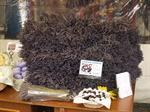A distance learning course in Aromatherapy
Learn about growing and using essential oils in your own home or at work.
 Learn about essential oils, herb oils and their uses.
Learn about essential oils, herb oils and their uses.- Learn about plant names and classifications, and the importance of identifying these.
- Learn about different essential oils.
- Study different methods of extraction.
- Develop your knowledge of hazardous herbs and oils.
COURSE STRUCTURE AND CONTENT
Lesson 1. Plant Identification
Understand the classification system used for naming plants and the importance of this to an aroma therapist.
- Importance of Correct Plant Identification
- Plant Name Changes
- Common Names
- Scientific Names
- Levels of Classification in Plant Taxonomic System
- Plant Families
- Pronunciation of Plant Names
- Introduction to Chemistry of Herb Plants
- Parts of a Compound; Biochemical Groups, Chemical Names
- What is an Acid or Base
- Alkaloids
- Tannins
Lesson 2. Introduction to Aromatherapy
The history of aromatherapy. How aromatherapy actually works. Basic chemistry of essential oils.
- Origins of Aromatherapy
- Top Notes, Middle Notes
- Aromatherapy Consultations
- Natural Chemicals in Plants
- Saponins; Phenolglycosides; Anthraglycosides; Flavonoids; Mustard Oils; Polysaccharides; Prussic Acid; Glycosides; Coumarin; Essential Minerals, etc
- Resources
Lesson 3. Essential Oils
The therapeutic benefits of oils and how to use them.
- Introduction
- Benzoin
- Bergamot
- Cedar Wood
- Chamomile
- Clary Sage
- Eucalyptus
- Frankincense
- Geranium
- Juniper
- Lemon
- Lavender
- Marjoram
- Orange
- Peppermint
- Rose Otto
- Rosemary
- Sandalwood
- Tea Tree
- Thyme
- Ylang Ylang
- Australian Bush Flower Remedies
Lesson 4. Safe Use of Essential Oils
Learn to use essential oils safely, in a controlled manner.
- How Essential Oils Work
- Inhalation
- Absorption
- Quantities to Use: Recommended rate, oil type, smell
- Blending Oils
- Children
- During Pregnancy
- For Animals
Lesson 5. Carriers
Learn about the properties of carriers and how to use them.
- Using Carriers
- Sweet Almond Oil
- Apricot Kernel Oil
- Avocado Oil
- Canola Oil
- Burners
- Inhalation
- Spray, Basin, Hands, Bath
- Carrier Oils, Creames and Lotions
Lesson 6. Growing and Harvesting Herbs for Essential Oil
Methods of growing plants for essential oil extraction. When, what, and how to harvest.
- Herb Cultivation
- Harvesting different plant parts
- Harvesting different types of Herbs
- Expected Yields for Different Herbs
- Harvesting for Essential Oils; Tea Tree, Lavender
- Post Harvest Handling of Herbs; temperature, moisture loss, physical damage ethylene, pathogens
- Post Harvest Preservation: Fresh, Modified Atmosphere Packaging
Lesson 7. Methods of Extraction
Learn extraction methods and how to evaluate to economic viability of producing your own essential oils.
- Introduction
- Water Distillation
- Steam Distillation
- Maceration
- Effleurage
- Expression
- Fixatives
- Herbal Preparations
- Preparing Teas, Rinses and Baths
- Preparations using different herbs
- Decoction
Lesson 8. Hazardous Herbs and Oils
Become aware of the danger of some oils. Safe practice.
- Introduction
- Carcinogens
- Photosensitisers
- Allergens
- Hormone Like Affects
- Teratogens
- Cellular Respiratory Inhibitors
- Cathartics
- Abortifacients and Irritants
- Alkaloids; types
- Toxic Amino Acids
- Glycocides
- Terpenes
- Plant Acids
- Poly-ynes
- Furanocoumarins
- Proteins
WHAT YOU WILL DO IN THIS COURSE
Below are some of the exercises you will do in this course.
- Give the scientific names (genus, species and variety names) of ten different plants from which essential oils are derived.
- Research an essential oil of your choice. Find out as much as you can about the oil including:
- Suggest different blends that can be used for treating a head cold.
- List a range of oils that would be considered safe to use for children.
- List a range of types of vegetable oils appropriate for use in massage and indicate what types of skin the oils are good for.
- Explain why some herbs tend to be collected in the morning, some before flowering, some during flowering, and others at various times of the year.
- Submit your detailed costing for processing herb materials to produce essential oils.
- Discuss which essential oils may not be safe for use during pregnancy.
WHY YOU NEED THIS COURSE
All kinds of chemical compounds occur in plants. Some are toxic, some may be toxic in high quantities, and others may be required in high concentrations to be of any use. Knowledge of these chemicals, and an understanding of what effect they may have, is imperative for aromatherapists.
Chemicals in aromatic plants can penetrate the body as a smell drifting through the air; or through the skin it comes in contact with. Either way, the wrong chemicals can be bad for the body, but the right chemicals can have a very positive effect.
Most people know essential oils by their common names, such as Lavender, Thyme or Eucalyptus; however, unless you are aware of the botanical names, you cannot be sure of the source of the oil you are using.
Learning about the differences between the good and bad, is pivotal to any use of aromatherapy.
OUR STUDENTS SAY ...
"This course was very interesting, challenging and very worthwhile"
N. Mills, Aromatherapy
START LEARNING ANYTIME
You can enrol on Aromatherapy at any time - the course is studied by distance learning. Students are supported in their studies by our excellent, highly knowledgeable tutors.
If you have any questions or would like to know more, please get in touch with our specialist Horticulture tutors today - they will be pleased to hear from you.